#railroad unions
Text
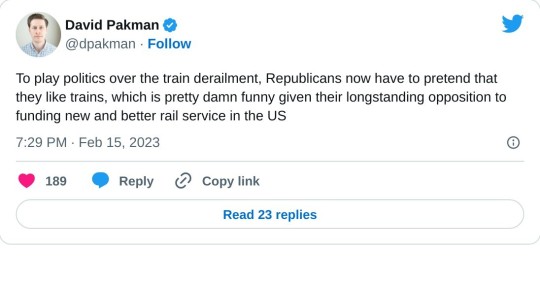
#us politics#news#twitter#tweet#2023#daivd pakman#norfolk southern#east palestine#ohio#train derailment#hazardous chemical spill#railway workers#railroads#railroad unions#conservatives#republicans#gop#gop policy
76 notes
·
View notes
Text
Sen. Bernie Sanders said late Tuesday night that it was time to "put up or shut up" for any U.S. lawmaker who claims to fight for the working class as he and other progressives in Congress vowed to insert paid sick leave into a labor agreement between railway workers and the nation's rail companies.
With a vote in the U.S. House as early as Wednesday morning, Sanders was asked by MSNBC host Chris Hayes whether Congress has the authority to mandate that sick leave—the final key demand of railway workers unions who have battling the carriers for months—be added to the deal that congressional lawmakers have been asked by President Joe Biden to force through as a way to avert a strike by the workers that would have huge impacts on the national economy.
"Congress has the power to come up with an agreement in order to protect the economy," said Sanders. While he said that he doesn't know anybody who wants a strike—and acknowledged that such a work stoppage would hurt the broader economy—Sanders said the "bottom line" in this fight is quite clear.
"The bottom line," said Sanders, "is that the American people and workers throughout this country are profoundly disgusted by the kind of corporate greed that we are seeing. Everybody knows that billionaires are getting richer, working people are struggling, corporate profits are at an all-time high, and they're making goods unaffordable for ordinary Americans—that's the overall reality. And what you're seeing in the rail industry is that phenomenon in spades."
Citing statistics that show the major rail carriers have made an estimated $21 billion in profits over the last three quarters, another $25 billion in stock buybacks to enrich their wealthy investors, and multi-million dollar salaries to top executives, Sanders slammed the fact that the railway workers themselves "have zero—underline zero—guaranteed sick leave."
Watch the full interview:
youtube
On Tuesday night, Rep. Jamaal Bowman (D-N.Y.) introduced an amendment in the House that would add seven paid sick days to the labor contract proposal that was negotiated with the assistance of the White House earlier this year, but subsequently rejected by a number of the railway unions for lack of sick leave. With the strike deadline looming, Biden on Monday angered many rank-and-file union members and outside progressives by asking Congress to force through the previous contract deal without pushing for the inclusion of sick leave.
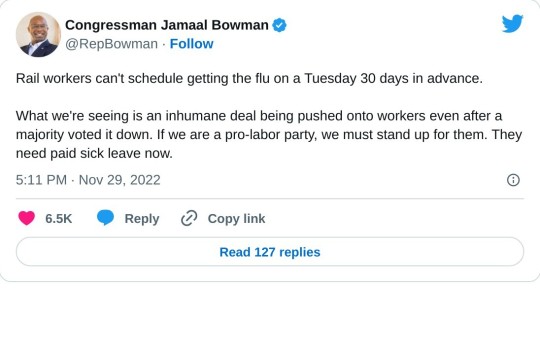
While House Speaker Nancy Pelosi on Monday backed Biden's call to push through a vote on the contract "with no poison pills or changes to the negotiated terms," but in a Dear Colleague letter issued Tuesday evening she adjusted that course by indicating that two votes would be held, explaining to members:
• First, we will consider the strike-averting legislation to adopt the Tentative Agreement, as negotiated by the railroad companies and labor leaders.
• Next, we will have a separate, up-or-down vote to add seven days of paid sick leave for railroaders to the Tentative Agreement.
• Then, we will send this package to the Senate, which will then go directly to President Biden for signature.
With Sanders vowing to fight for the same kind of inclusion in the Senate, reporting from Capitol Hill indicated that there may be enough Republican support for adding the paid sick leave to bypass the 60-vote threshold and overcome a filibuster in the upper chamber.
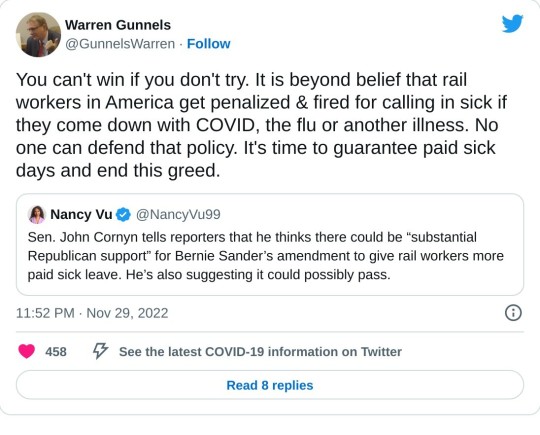
Asked if he thought he could get the ten necessary votes from the GOP in the Senate, Sanders said, "Well, who knows?" as he mentioned that Sen. John Cornyn (R-Texas), the party caucus' whip, has indicated "significant" support for the amendment among Republicans.
"Look, you have a number of Republicans who claim—claim—to be supporters of the working class," he added. "Well, if you are a supporter of the working class how are you going to vote against the proposal which provides guaranteed paid sick leave to workers who have none right now? So I am cautiously optimistic that we can get this done."

Asked by Hayes if this represents a "put your money where your mouth is" moment for a Republican Party that has tried to claim the mantle of being the authentic blue-collar party, Sanders nodded in agreement.
"Put up or shut up," said Sanders. "If you can't vote for this, to give workers today—who really have hard jobs, dangerous jobs—if you can't give them paid sick leave, don't tell anybody that you stand with working families."
#us politics#news#2022#sen. bernie sanders#vermont#biden administration#railway workers#railroads#railroad unions#railroad strike#paid sick leave#us house of representatives#us senate#msnbc#chris hayes#common dreams#progressives#progressivism#worker's rights#union workers#working class#YouTube#videos#Rep. Jamaal Bowman#twitter#tweet#speaker nancy pelosi#rep. nancy pelosi
136 notes
·
View notes
Text
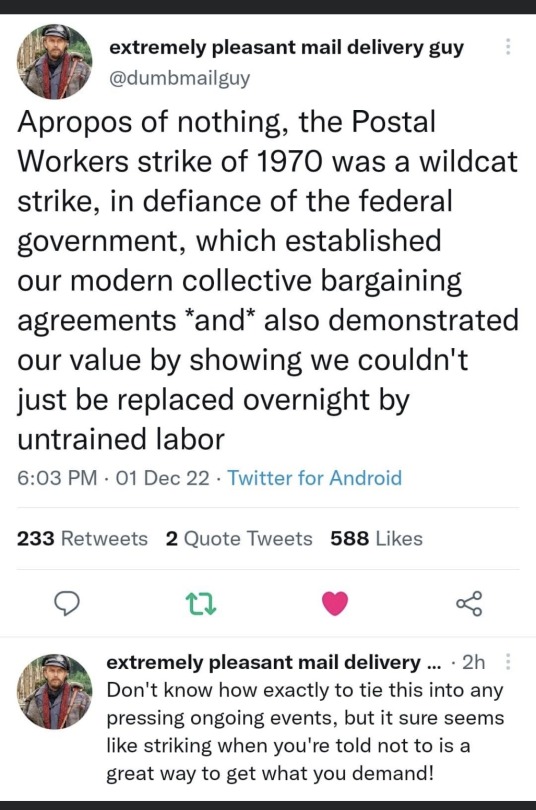
18K notes
·
View notes
Text
for general strikes, against liberal complacency
the argument goes: "we cannot afford to disrupt our economy, we cannot allow the railroad workers to strike"
this is the argument of a liberal collaborator, who sides with oncoming fascism against the rest of us
fascist regimes aren't defeated at the ballot box -- they are defeated through intense and often violent struggle
general strikes, guerrilla tactics, civil or international wars -- these are historically the means by which dictators, military regimes and outright fascist governments have been overthrown
and yet liberal collaborators, who would rather see Trump win than Bernie Sanders (who is hardly a socialist but better than most Democrats), tell us that even a railroad strike is too much
they cannot be trusted to fight for us, to defend us, or even to side with us
and yet we have no other means, no independent political vehicle, to organize the fight against fascism and for liberation
this is a problem without an answer at the moment -- and just saying "we need a socialist party" when all the socialist leadership have failed time and again --regardless of how loudly they proclaim their revolutionary credentials, and I do mean *all* -- isn't enough, and in fact bears all the signs of a broken neurotic loop, rather than a cogent political strategy
we have a problem without an answer. but first we must fully and deeply acknowledge that problem: we have to fight against the rise of fascism, and we lack the organizational means to do so
so let us at least recognize one weapon, one strategic tool: the general strike, shutting down economic movement for political goals. let us support that idea, nurture it, spread it.
because even if we lack the full platform necessary to lead the struggle, at least people can be prepared to fight back when the fascists make their move again -- and they will -- Jan 6 was a dumb dress rehearsal (see 'Beer Hall Putsch') but the next one won't be so inarticulate
#railroad strike#railroad unions#Senate#Congress#general strike#railroad workers#brotherhood of railroad signalmen#smart-td#Brotherhood of Maintenance Way Employees Division#joe biden#fascism
1 note
·
View note
Text
This this this this
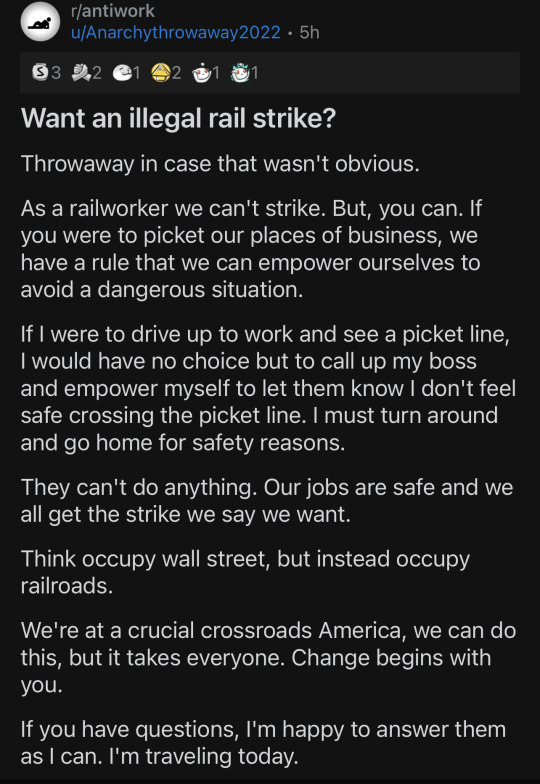
3K notes
·
View notes
Text
Big Train managers earn bonuses for greenlighting unsafe cars
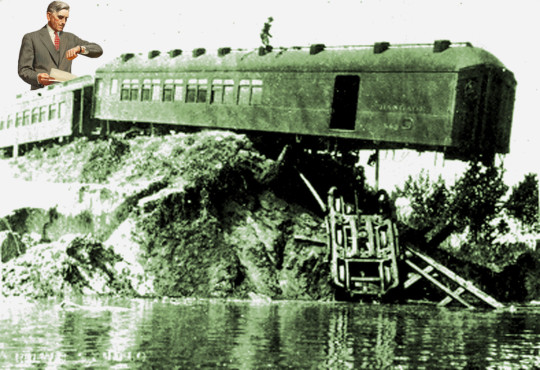
Tomorrow (November 16) I'll be in Stratford, Ontario, appearing onstage with Vass Bednar as part of the CBC IDEAS Festival. I'm also doing an afternoon session for middle-schoolers at the Stratford Public Library.

Almost no one knows this, but last June, a 90-car train got away from its crew in Hernando, MS, rolling three miles through two public crossings, a ghost train that included 47 potentially explosive propane cars. The "bomb train" neither crashed nor derailed, which meant that Grenada Railroad/Gulf & Atantic didn't have to report it.
This is just one of many terrifying near-misses that are increasingly common in America's hyper-concentrated, private equity-dominated rail sector, where unsafe practices dominate and whistleblowers face brutal retaliation for coming forward to regulators.
These unsafe practices – and the corporate policies that deliberately gave rise to them – are documented in terrifying, eye-watering detail in a deeply reported Propublica story by Topher Sanders, Jessica Lussenhop,Dan Schwartz, Danelle Morton and Gabriel L Sandoval:
https://www.propublica.org/article/railroad-safety-union-pacific-csx-bnsf-trains-freight
It's a tale of depraved indifference to public safety, backstopped by worker intimidation. The reporting is centered on railyard maintenance inspectors, who are charged with writing up "bad orders" to prevent unsafe railcars from shipping out. As private equity firms consolidated rail into an ever-dwindling number of companies, these workers face supervisors who are increasingly hostile to these bad orders.
It got so alarming that some staffers started carrying hidden digital recorders, so they could capture audio of their bosses illegally ordering them to greenlight railcars that were too unsafe for use. The article features direct – and alarming – quotes, like supervisor Andrew Letcher, boss of the maintenance crews at Union Pacific's Kansas City yard saying, "If I was an inspector on a train I would probably let some of that nitpicky shit go."
Letcher – and fellow managers for other Tier 1 railroads quoted in the piece – aren't innately hostile to public safety. They are quite frank about why they want inspectors to "let that nitpicky shit go." As Letcher explains, "The first thing that I’m getting questioned about right now, every day, is why we’re over 200 bad orders and what we’re doing to get them down."
In other words, corporate rail owners have ordered their supervisors to reduce the amount of maintenance outages on the rail lines, but have not given them additional preventative maintenance budgets or crew. These supervisors warn their employees that high numbers of bad orders could cost them their jobs, even lead to the shutdown of the car shops where inspectors are prone to pulling dangerous cars out of service.
It's a ruthless form of winnowing. Gresham's Law holds that "bad money drives out good" – in an economy where counterfeit money circulates, people preferentially spend their fake money to get it out of their hands, until all the money in circulation is funny money. This is the rail safety equivalent: simply fire everyone who reports unsafe conditions and all your railcars will be deemed safe, with the worst railcars shipped out first. A market for lemons – except these aren't balky used sedans, they're unsafe railcars full of toxic chemicals or explosive propane.
When cataclysmic rail disasters occur – like this year's East Palestine derailment – the rail industry reassures us that this is an isolated incident, pointing to the system's excellent overall safety record. But that record is a mirage, because the near-misses don't have to be reported. Those near-misses are coming more frequently, as the culture of profit over safety incurs a mounting maintenance debt, filling America's rails with potential "bomb cars."
Rail mergers and other forms of deregulated, anything-goes capitalism are justified by conservative economists who insist that "incentives matter," and that the profit motive provides the incentive to improve efficiency, leading to lower costs and better service. But the incentive to externalize risk, kick the can down the road, and capture regulators rarely concerns the "incentives matter" crowd.
Here's an incentive that matters. Rail managers' bonuses – as much as a fifth of their take home pay – are only paid if the trains they oversee run on time. Inspectors have recorded their managers admitting that they have quotas – a maximum number of bad orders their facility may produce, irrespective of how much unsafe rolling stock passes through the facility.
Inspectors have caught their managers removing repair order tags from cars they've flagged as unsafe. Inspectors will log orders in a database, only to have the record mysteriously deleted, or marked as serviced when no service has occurred. Some inspectors have seen the same cars in their yard with the same problems, and repeatedly flagged them without any maintenance being performed before they're shipped out again.
Former managers from Union Pacific, CSX and Norfolk Southern told Propublica that they operated in an environment where safety reports were discouraged, and that workers who filed these reports were viewed as "complainers." Workers furnished Propublica with recordings of rail managers berating them for reporting persistent unsafe conditions the Federal Railroad Administration. Other workers from BNSF said that they believed that their bosses were told when they called the company's "confidential" work-safety tipline, setting them up for retaliation by bosses who'd falsified safety reports.
Whistleblowers who seek justice at OSHA are stymied by long delays, and while switching their cases to court can win them cash settlements, these do not get recorded on the company's safety record, which allows the company to go on claiming to be a paragon of safety and prudence.
The culture of retaliation is pervasive, which explains how the 47-cars worth of propane on the "bomb train" that rolled unattended over three miles of track never made the news. There is a voluntary Close Call Reporting System (operated by NASA!) where rail companies can report these disasters. Not one of America's Class 1 rail companies participate in it.
After the East Palestine disaster, Transport Secretary Pete Buttigieg pushed the rail companies to join, but a year later, none have. It's part of an overall pattern with Secretary Buttigieg, who has prodigious, far-reaching powers under USC40 Section 41712(a), which allow him to punish companies for "unfair and deceptive" practices or "unfair methods of competition":
https://pluralistic.net/2023/01/10/the-courage-to-govern/#whos-in-charge
Buttigieg can't simply hand down orders under 41712(a) – to wield this power, he must follow administrative procedures, conducting market studies, seeking comment, and proposing a rule. Other members of the Biden administration with similar powers, like FTC chair Lina Khan, arrived in office with a ranked-priority list of bad corporate conduct and immediately set about teeing up rules to give relief to the American public.
By contrast, Buttigieg's agency has done precious little to establish the evidentiary record to punish the worst American companies under its remit. His most-touted achievement was to fine five airlines for saving money by cancelling their flights and stranding their passengers. But of the five airlines affected by Buttigieg's order, four were not US companies. The sole affected US carrier was Spirit airlines, with 2% of the market. The Big Four US airlines – who have a much worse record than the ones that were fined – were not affected at all:
https://prospect.org/infrastructure/transportation/ftc-noncompete-airline-flight-cancellation-buttigieg/
Rather than directly regulating the US transportation sector, Buttigieg prefers exacting nonbinding promises from them (like the Tier 1 rail companies' broken promise to sign up to the Close Call Reporting System). Under his leadership, the Federal Railroad Agency has proposed weakening rail safety standards, rescinding an order to improve the braking systems on undermaintained, mile-long trains carrying potentially deadly freight:
https://pluralistic.net/2023/02/11/dinah-wont-you-blow/#ecp
The US transportation system is accumulating a terrifying safety debt, behind a veil of corporate secrecy. It badly demands direct regulation and close oversight.
If you are interested in rail safety, I strongly recommend this episode of Well There's Your Problem, "a podcast about engineering disasters, with slides" – you will laugh your head off and then never sleep again:
https://www.youtube.com/watch?v=0BMQTdYXaH8

If you'd like an essay-formatted version of this post to read or share, here's a link to it on pluralistic.net, my surveillance-free, ad-free, tracker-free blog:
https://pluralistic.net/2023/11/15/safety-third/#all-the-livelong-day
#pluralistic#safety third#safety#whistleblowers#trains#railroad#rail safety#propublica#east palestine#monopoly#osha#bnsf#csx#bad orders#federal railroad administration#fra#association of american railroads#norfolk southern#union pacific#incentives matter#bomb train#Confidential Close Call Reporting System
158 notes
·
View notes
Text
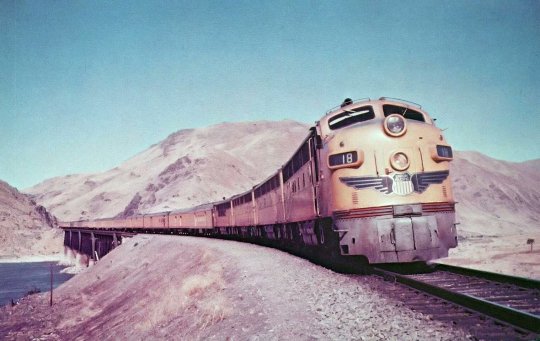
93 notes
·
View notes
Text
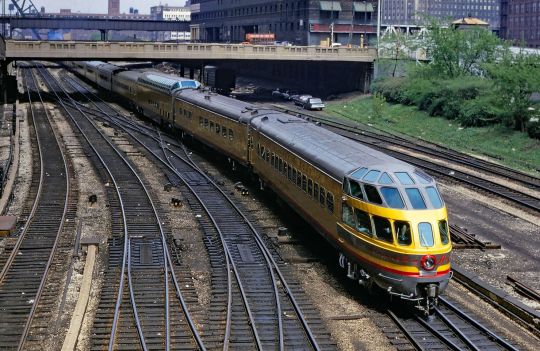
Afternoon Hiawatha was photographed in this scene leaving Chicago Union Station in June 1968.
#1968#hiawatha#chicago union station#trains#train#vintage train travel#vintage trains#railway#railroad#vintage railroads
64 notes
·
View notes
Text
Trainposting :3
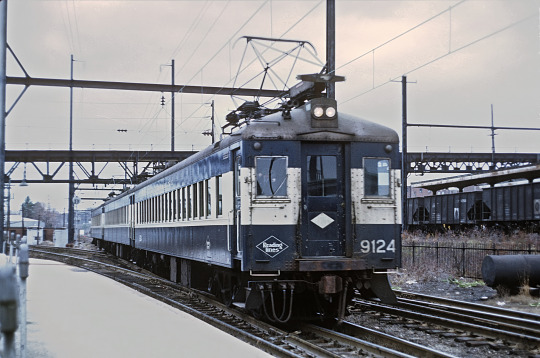

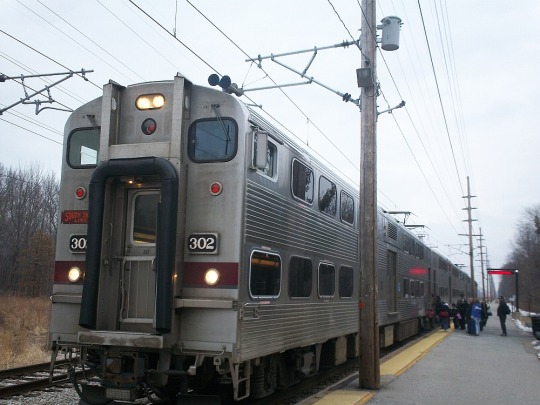
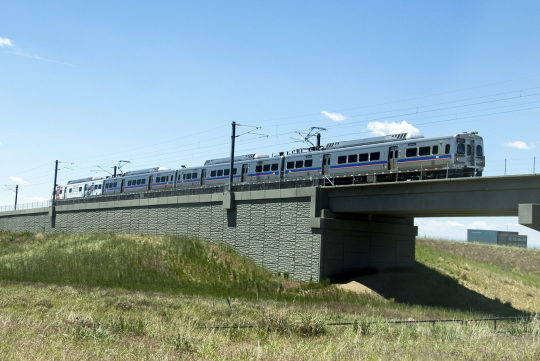
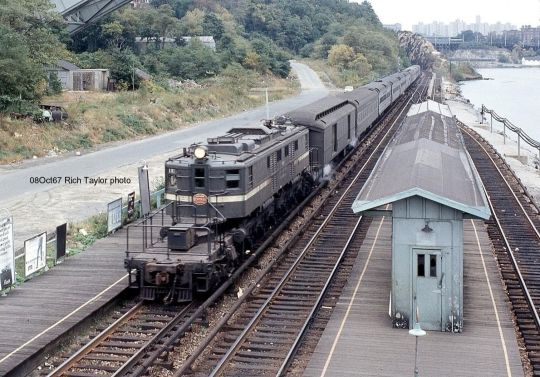
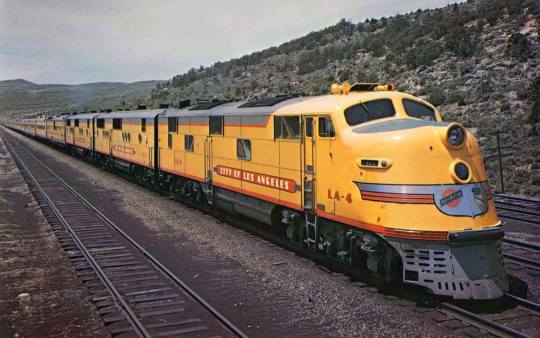


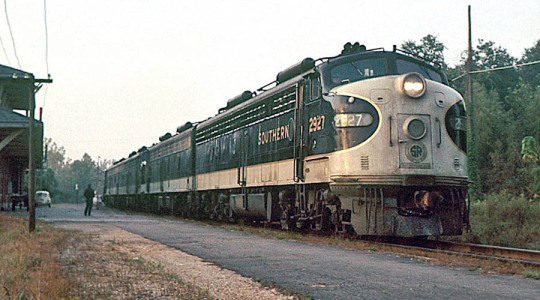

#trainposting#amtrak#electric traction#reading railroad#amtrak cascades#southern railway#southern serves the south#northern pacific#rock Island Railroad#new york central#south shore railroad#union pacific#steam locomotive#passenger train#electrification#electric train
74 notes
·
View notes
Text
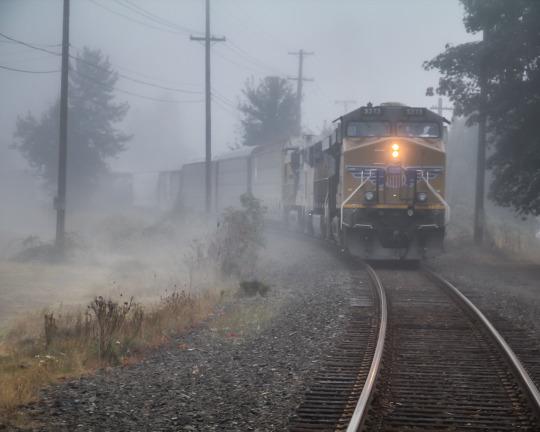
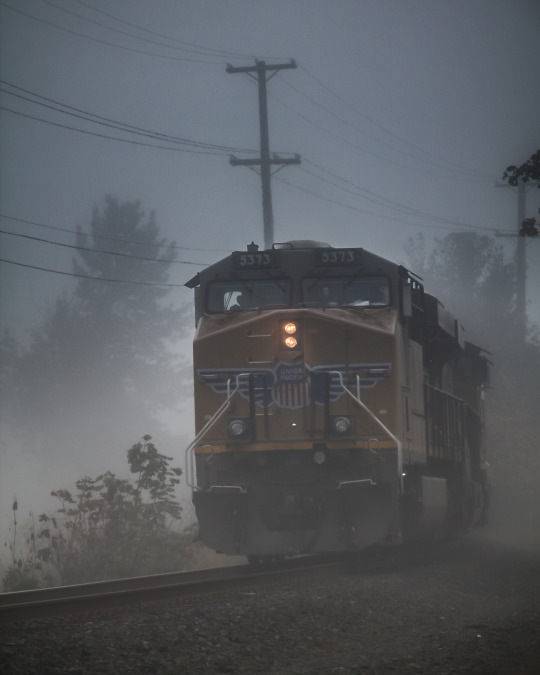
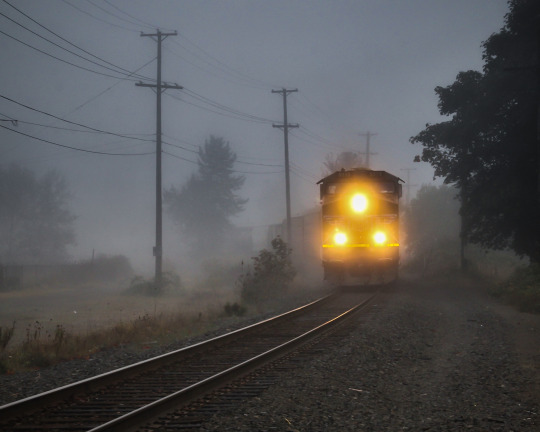
Out Of The Fog - Union Pacific 5373 in Eugene Oregon - October 2012
#oregon#the great pnw#photographers on tumblr#pnw#lanecounty#eugene#original photography#lane county#union pacific#railroad#rails#fog
164 notes
·
View notes
Text
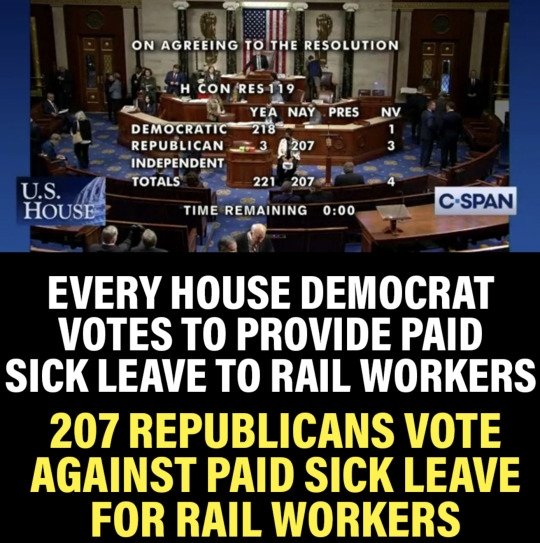
After monthslong fears of a national railroad strike, Congress voted Wednesday to force an end to negotiations between the railroads and their unions with a pair of bills designed to draw concessions from both sides.
One bill (which passed with 79 Republican votes and 211 Democratic ones) codified the higher wages the railroads were offering. Members of Congress also voted to implement mandatory sick time as part of the deal, a nod to worker demands for more paid time off that railroads were unwilling to relent on.
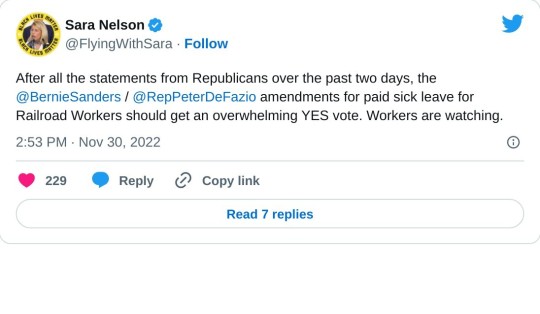
That successful amendment, sponsored by Democratic Representative Peter DeFazio and independent Senator Bernie Sanders, came on the heels of bipartisan criticism of President Joe Biden's support of a deal without concessions for paid time off, a deal-breaker that earned scorn from progressives like Alexandria Ocasio-Cortez alongside conservatives like Missouri Senator Josh Hawley.
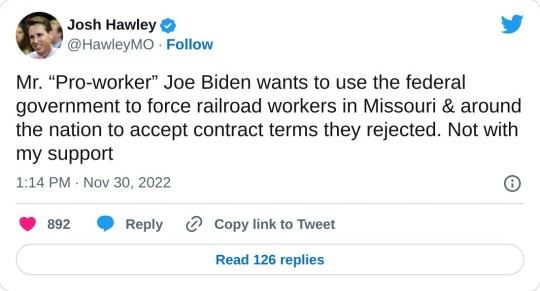
Florida Senator Marco Rubio tweeted Tuesday he "will not vote to impose a deal that doesn't have the support of the rail workers."
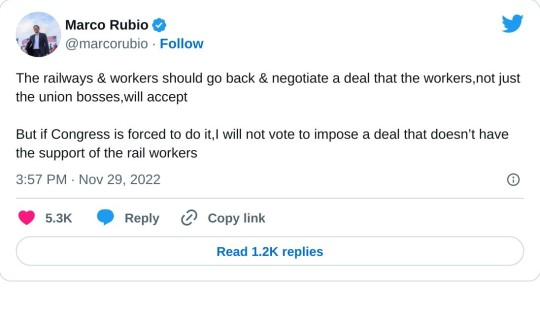
Ultimately, all but three Republican members of Congress—who, notably, have unlimited sick days and all 10 federal holidays off per year—still voted against it.
Internally, the result was largely expected. House Minority Leader Kevin McCarthy indicated to reporters prior to the vote few Republican members were expected to vote in favor of increasing paid time off.

But outwardly, it's not clear why: So far, no Republicans have offered a public rationale for rejecting the deal, nor is it clear whether they opposed the concept of sick time or congressional intervention in railroad workers' efforts to negotiate the deal for themselves.
In early negotiations, the unions requested 15 days of sick leave, while the resolution adopted Wednesday notably had just seven. Numerous Democrats also voted against the larger bill to avert the strike, calling the compromise a betrayal of workers' desire to negotiate a contract on their terms.
However, the fact no Democrats voted against the sick time provision signaled to some that Republicans were voting to prevent workers from obtaining benefits they themselves have: namely, the ability to take time off work whenever they feel the need.
In an earlier vote in the Senate this year, North Carolina Republican Richard Burr and Mississippi Republican Roger Wicker introduced a resolution intended to resolve the strike that did not include provisions for sick leave, earning scorn from Sanders in a speech on the Senate floor. (The resolution failed.)
The disparity between railroaders and members of Congress was visibly on display on social media after the vote.
Notably, a Politifact examination of a Facebook post several years ago alleging similar claims determined there is no limit on sick days or time off for members of Congress, while a Bureau of Labor Statistics report from 2020 found the average private industry worker received an average of eight paid holidays, seven paid sick leave days and 11 paid vacation days per year after one year of work.
And while railroaders get anywhere between three to four weeks of paid vacation and over 10 personal leave days per year, many do not have the flexibility to use them the way people in other industries—like Congress—typically do.
"The 'working class party' strikes again," Justin Baragona, a media reporter for the Daily Beast, tweeted following the vote.
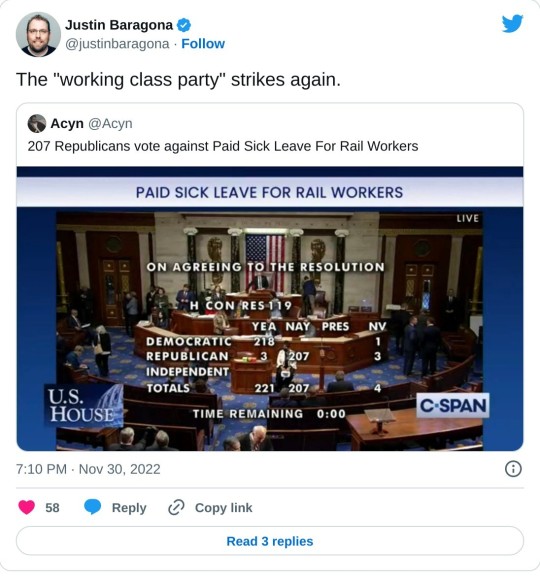
#us politics#2022#twitter#tweet#republicans#conservatives#gop#paid sick leave#railway workers#railroad unions#railroad strike#railroads#working class#worker's rights#worker's union#pro union#union workers#newsweek#rep. Peter DeFazio#sen. bernie sanders#sara nelson#sen. josh hawley#sen. marco rubio#jake sherman#rep. kevin mccarthy#Justin Baragona#sen. richard burr#sen. Roger Wicker
48 notes
·
View notes
Link
By Stephen Millies
Every worker has the right to withhold their labor. Concerted action and collective bargaining by workers are supposed to be protected by law.
That hasn’t stopped President Biden from demanding on Nov. 28 that Congress stop over 100,000 railroad workers from striking. Biden insisted that Congress enforce a tentative deal “without any modifications or delay.”
#railstrike#railroad workers#union busting#Joe Biden#Congress#big business#bnsf#capitalism#class struggle#solidarity#union#workers#labor#sick leave#strike#Struggle La Lucha
341 notes
·
View notes
Text

Jos satut olemaan rikas (itse en valitettavasti ole) on nyt tarjolla mahdollisuus ostaa pala suomalaista rautatiehistoriaa: Haapamäen höyryveturipuisto myy Huutokaupat.comissa K2/Tk2-veturia vuodelta 1904. Lähtöhinta on suolainen 30 000 €, mutta tällaista ei kyllä sitten kellään muulla ole mökillään.
Samoin höyryveturipuisto myy neuvostoliittolaista L-veturia (40 000€) sekä matkustajia kuljettavaa puutarharataa Dr12-veturin näköisine vetureineen, vaunuineen ja ratoineen (45 000€).

Lisäksi myynnissä on ilmatorjuntatykki, mutta koska VR:n on rauhalle omistautunut yhtiö emme kommentoi sitä enempää. Höyryveturipuiston myynti-ilmoituksen löytyvät täältä: https://huutokaupat.com/haapamaen-hoyryveturipuisto-oy
#railroad#train#locomotive#model railroad#model trains#suomeksi#vr#haapamäen höyryveturipuisto#soviet union
49 notes
·
View notes
Text

Union Pacific Engine and Station, Rock Springs, Wyoming, 1969.
#railroad#station#engine#union pacific#rock springs#sweetwater county#wyoming#1969#photographers on tumblr
20 notes
·
View notes
Video
Iowa Interstate - Blue Island, IL by d.w.davidson
Via Flickr:
Iowa Interstate GP9 No. 300 (former Western Pacific No. 725) is seen departing the IAIS yard at Blue Island, in January 1987.
#iais#iowa interstate railroad#up#union pacific#1987#trains#freight train#history#blue island#illinois
21 notes
·
View notes
Text
GRIND THIS COUNTRY TO A HALT! GENERAL! STRIKE!
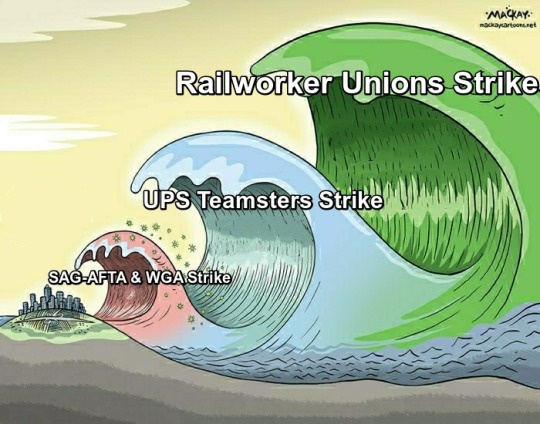
#strike#unions#sag afta#wga#ups#teamsters#railroads#railworkers#I'm Canadian but I'm cheering you all on so hard#You can do it I believe in you
66 notes
·
View notes
